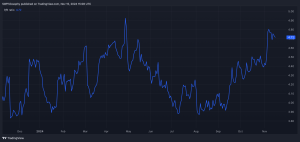One cheap FTSE 100 stock that’s caught my attention is Prudential (LSE: PRU). It’s down 21% in 2024, 37% over one year, and a whopping 50% over three years.
In my view, this chronically undervalues the life insurer relative to its long-term opportunity. And it seems I’m not the only one to think this because a non-executive director at Prudential recently bought shares.
On 4 July, George Sartorel scooped up 8,000 shares at 725p for a total value of £58,000. This followed recent purchases by other directors, while in June, CFO Ben Bulmer snapped up 50,000 shares at an average price of 761p for a total of £380,795.
Yet the share price just keeps falling. As I type, it’s now at 676p. That’s its lowest level since mid-2012!
Why insiders buy
There can be loads of reasons why an insider sells shares. Perhaps they have a tax bill, want to fund a family member’s wedding, or have been advised to diversify their assets.
But insiders only buy shares with their own money for one reason. They think the stock’s undervalued.
Therefore, it’s generally seen as a vote of confidence in the business. After all, who would know better a company’s prospects than the people running it?
With the benefit of hindsight, some of my worst investments have turned out to be where there was a lack of insider buying (not to be confused with insider trading, which is illegal).
For example, Ginkgo Bioworks (one of my worst-ever picks before I sold) has lost 87% of its market value in the past year. Yet beyond a couple of purchases in May, no company insiders have been buying the stock on the cheap. Quite the opposite, in fact.
The lesson for me is that if the executives running a firm see no value in its beaten-down stock, this might be a red flag. Many Prudential insiders are increasing their skin in the game, so this is a green flag for me.
Prudential is also buying back shares
In June, the Asia-focused insurer announced a massive $2bn share buyback programme to run between now and mid-2026. This represents approximately 8% of its outstanding stock!
It also said the 2024 annual dividend would grow by 7-9%. The forward yield is only 2.5%, but it has the potential to increase as the firm gets back on track after taking a hit during the pandemic.
Looking forward, Prudential remains bullish on its prospects across its markets in Asia and Africa. These countries have a combined population of 4bn and greater growth potential than the West due to increasing insurance adoption rates.
One risk here though is China, a massive market where consumers continue to pull back on spending. This might impact the company’s growth rates in the coming quarters. It’s something to bear in mind and seems to be weighing on the share price.
A potential bargain
Still, net profit this year is forecast to be $2.5bn, up from $1.7bn last year. And the stock’s trading at a mere 9.1 times this year’s expected earnings per share. That’s even cheaper than the FTSE 100 average.
When I have cash to invest in August, I’ll follow those directors and add this beaten-down stock to my portfolio.
This post was originally published on Motley Fool







